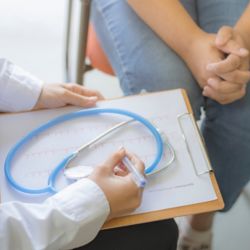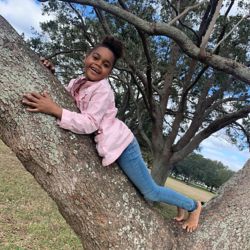Why HPV Vaccination Is Important for Childhood Cancer Survivors
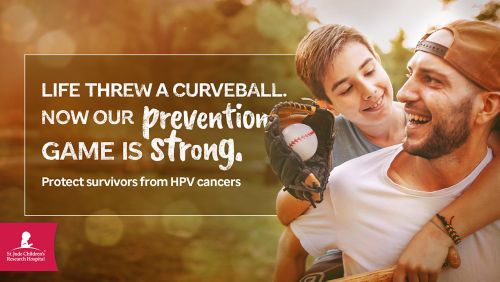
The St. Jude HPV Cancer Prevention Program launched the Survivor Proud campaign to help increase HPV vaccination rates among childhood cancer survivors.
Human papillomavirus (HPV) vaccination is one of the best ways to help prevent cancer. But not enough people are getting the HPV vaccine in the United States. That includes childhood cancer survivors.
Childhood cancer survivors have a higher risk of getting HPV infections and new HPV cancers in adulthood. Their higher HPV risk could be due to weakened immune systems from cancer therapy. HPV vaccination is effective in helping them avoid getting HPV cancers.
How HPV is linked to cancer
HPV is a common virus that causes nearly 40,000 new cases of cancer each year in the U.S. Everyone can be affected by HPV infections. These common infections can lead to 6 types of cancers: oropharyngeal (mouth and throat), cervical, anal, vulvar, penile, and vaginal.
HPV can spread through intimate contact. It can stay dormant (inactive) in your body for years before it leads to cancer. People with weaker immune systems, like childhood cancer survivors, are more likely to have HPV infections that can lead to cancer.
Fortunately, there is a safe and effective HPV vaccine that can prevent more than 90% of these HPV-related cancers.
Parents, caregivers, and cancer survivors
Make sure to get your HPV vaccine. It is a simple and potentially life-saving step you can take to guard against future cancers.
When to get the HPV vaccine
HPV vaccination has been a major tool for HPV cancer prevention in the U.S. since 2006. The Centers for Disease Control and Prevention (CDC) recommends HPV vaccination (known as Gardasil®9) routinely to children ages 11–12 and starting at age 9. Getting vaccinated in this age range (9–12 years) is considered on-time vaccination. HPV vaccination is recommended for everyone ages 9–26, and for some people ages 27–45 after discussing with health care providers about how the HPV vaccine might help them.
Although experts recommend HPV vaccination for adolescents, only 63% of adolescents in the U.S. have gotten the vaccine. This rate is below the national Healthy People 2030 goal of 80%.
HPV vaccine for cancer survivors
HPV vaccination is important for childhood cancer survivors to prevent them from having second HPV cancers as adults. Several studies have shown that as childhood cancer survivors get older, they have a slightly higher risk of developing a second cancer compared to people of the same age in the general population. Research supports the HPV vaccine’s safety for childhood cancer survivors.
For childhood cancer survivors, the Children’s Oncology Group (COG) Long-Term Follow-Up Guidelines recommend 3 doses of the HPV vaccine regardless of age at first vaccine dose, beginning 6 months after the completion of cancer therapy.
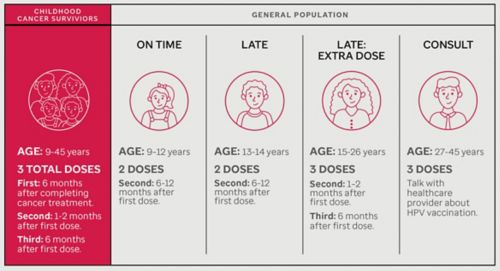
HPV vaccination recommendations for childhood cancer survivors and the general population.
It is important for childhood cancer survivors to talk with their cancer care team about their immune status, and to make sure they are getting the correct doses at the right times. Research shows that only about 24% of childhood cancer survivors get the HPV vaccine compared with 41% of people in the general population.
Increasing survivors’ vaccination rates
Despite its many benefits, HPV vaccination rates are still lower than they should be in childhood cancer survivors. This could be due to vaccine hesitancy, lack of information about the vaccine, or safety concerns. And survivors’ care teams often fail to recommend the vaccine.
Parents, caregivers, and cancer survivors: Make sure to get your HPV vaccine. It is a simple and potentially life-saving step you can take to guard against future cancers.
Cancer care providers play a key role in promoting HPV vaccination. Ask your care team about the HPV vaccine’s benefits and the risks of not being vaccinated. Hearing stories and evidence-based information can help you make an informed decision.
The St. Jude HPV Cancer Prevention Program team developed the Survivor Proud campaign along with other experts and patient family advisers. This campaign helps to build confidence in childhood cancer survivors about HPV vaccination and to improve HPV vaccination rates.
Learn more about the campaign at stjude.org/survivorproud.
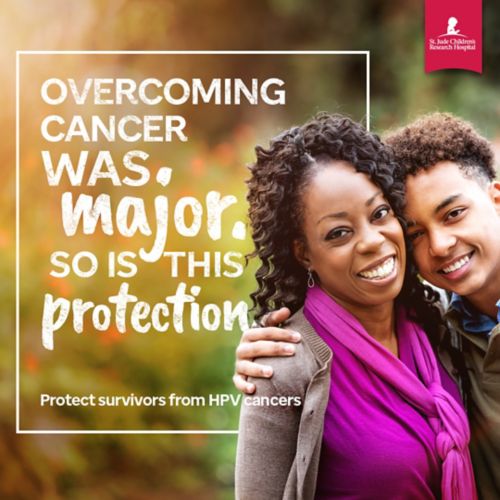
Empowering childhood cancer survivors
HPV Awareness Day is celebrated each year on March 4. It’s a day to share accurate information about HPV and support groups that need more protection.
Ask your health care team today about the HPV vaccine. This simple step can help prevent cancer and give you the chance to live a healthier, cancer-free life.



